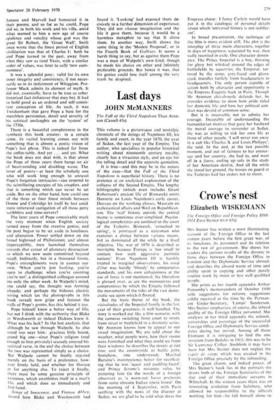Last days
JOHN McMANNERS
The Fall of the Third Napoleon Theo Aron- son (Cassell 45s) This volume is a picturesque and nostalgic chronicle of the doings of Napoleon III, his family and court, in the year 1870, the year of Sedan, the last year of the Empire. The author, who specialises in popular historical writing about nineteenth century royalty, clearly has a vivacious style, and an eye for the telling detail and the apposite quotation.
It is true—and this may be in the nature of the case—that the Fall of the Third Napoleon is superficial history. There is no pretence at an analytical explanation of the collapse of the Second Empire. The lengthy bibliography (which even includes Grant Robertson's ancient life of Bismarck) omits Dansette on Louis Napoleon's early career, Duveau on the working classes, Maurain on ecclesiastical affairs and Weil on Republican- ism. The 'real' history outside the central theme is sometimes over-simplified. Psycho- logical complexities are confined to the court of the Tuileries. Bismarck, 'crouched to spring', is portrayed as a statesman who exercises a choice between various means, but as dominated all the while by a fixed objective. The war of 1870 is described as inevitable because Europe is 'too small to contain two such aggressive patriotic nations'. Even Napoleon III is harshly treated in marginal observations; his coup (Petal was hardly 'bloody' by comparative standards, and his own unhappiness at the use of force is not mentioned; his liberalism is glossed over, as are the manoeuvres and compromises by which the Empire followed the movements of the tides of the vast demo- cratic sea upon which it floated.
But the basic theme of the book, the vicissitudes of the Imperial family in the last year of their greatness, is well handled. The story is worked out like a film scenario, with the cameras switching from court to street, from street to battlefield in a dramatic series. Mr Aronson knows how to appeal to our visual imagination. We are told about the weather, what people wore, how their rooms were furnished and what they could see from their windows; he describes the streets at riot time and the countryside as battle joins. Somehow, one understands Marshal Bazaine's incompetence better for recollect- ing that he was 'squat and pudding-faced', and Prince Jerome's nuisance value by picturing him (in the words of a foreign observer) as 'a worn-out basso profundo from some obscure Italian opera house'. On the morning of 4 September, with Paris seething with the news of the disaster at Sedan, we are glad to be told what dress the Empress chose: I fancy Carlyle would have put it in the catalogue of personal details about which 'universal history is not indiffer- ent'.
In broad presentation, the technique of the film is more evident still. The plot is the interplay of three main characters, together in days of happiness, separated by war, then sadly reunited in exile. One character domin- ates. The Prince Imperial is a boy, thirsting for glory but whisked around the edges of battlefields by equerries; the Emperor, tor- tured by the stone, grey-faced and glassy eyed, trundles futilely from headquarters to headquarters. The only person capable of action both by character and opportunity is the Empress Eugenie back in Paris. Though Mr Aronson chivalrously defends her, he provides evidence to show how pride ruled her domestic life and how her political con- duct was devoid of common sense.
But it is impossible not to admire her courage. Incapable of understanding the humanitarian motives that gave her husband the moral courage to surrender at Sedan, she was as willing to risk her own life as those of other people. will never run away in a cab like Charles X and Louis-Philippe'. she said. In the end, at the last possible moment, and out of fairness to her entour- age and her country, she had to, and went off in a fiacre, ending up safe in the study of her American dentist. And all the while she stood her ground, the troops on guard at the Tuileries had her orders not to shoot.


































 Previous page
Previous page